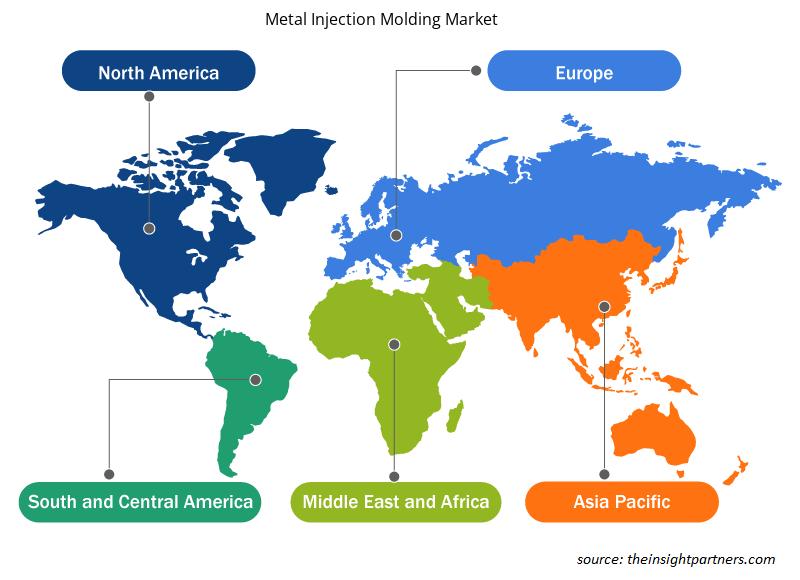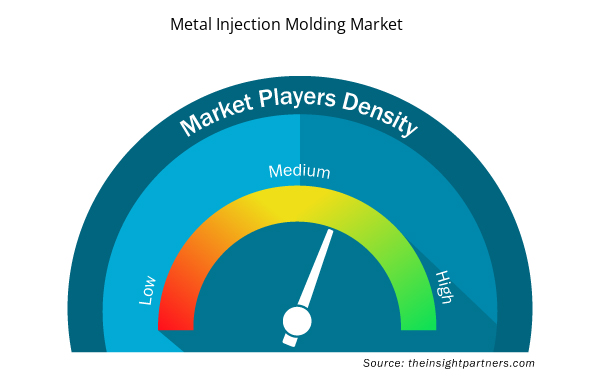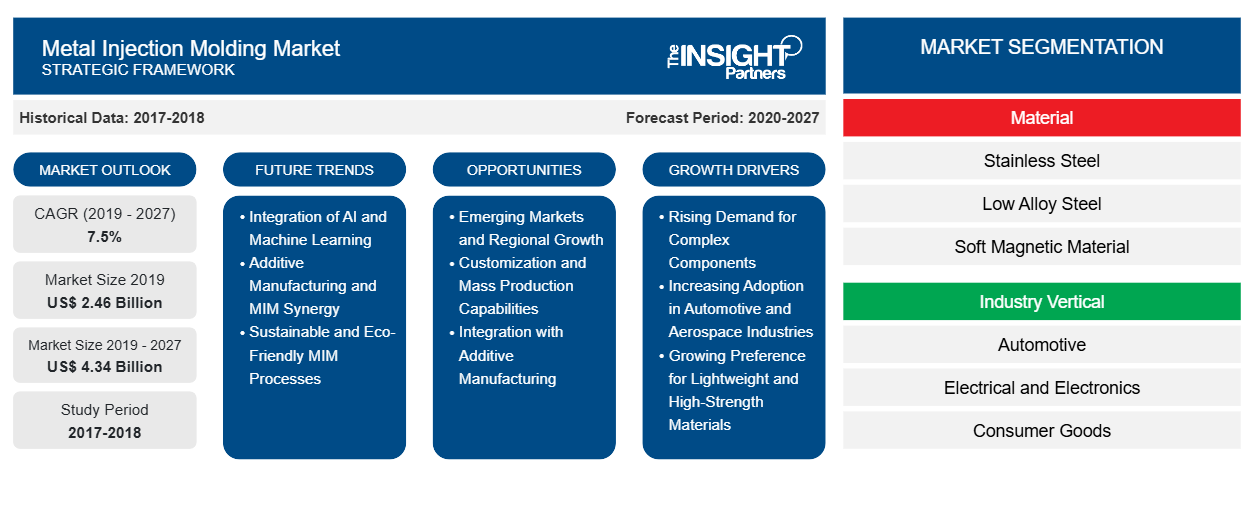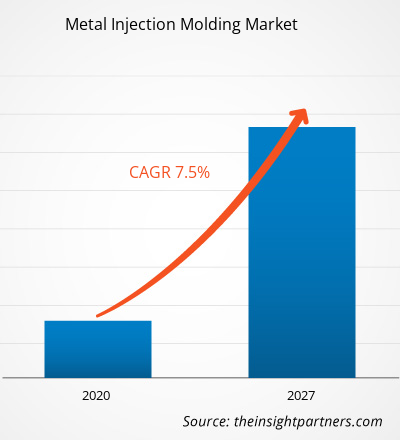[Forschungsbericht] Der Markt für Metallspritzguss wurde im Jahr 2019 auf 2.458,68 Millionen US-Dollar geschätzt und soll bis 2027 4.338,52 Millionen US-Dollar erreichen; von 2019 bis 2027 wird ein durchschnittliches jährliches Wachstum von 7,5 % erwartet.
Metallspritzguss ist ein flexibles, kostengünstiges und innovatives Verfahren, das Produktdesignern und Produktionsingenieuren bei der Verwendung von Metalllegierungen Vielseitigkeit bietet. Metall ist ein guter Ersatz für Kunststoff- und Keramikkomponenten, die die Anforderungen nicht erfüllen. Beim Metallspritzguss stehen Qualität und Präzision im Mittelpunkt, und der Prozess wird genau überwacht, um die Anforderungen zu erfüllen. Wenn für eine bestimmte Anwendung eine Metalllegierung ausgewählt wird, wird die Geometrie der Komponente durch die Kosten der Formgebungsvorgänge begrenzt. Der Metallspritzguss hilft, dieses Problem durch die Bildung der Nettoformteile im Werkzeug zu überwinden. Der Metallspritzguss bietet Vorteile wie Verschleiß- und Korrosionsbeständigkeit, thermische Stabilität, hohe mechanische Festigkeit und Dimensionsstabilität.
Im Jahr 2019 hatte der asiatisch-pazifische Raum den größten Anteil am globalen Markt für Metallspritzguss . Die zunehmende Urbanisierung, das Wachstum der Fertigungsindustrie und die steigende Nachfrage nach Autos und Elektronik dürften das Marktwachstum im asiatisch-pazifischen Raum vorantreiben. Die steigende Nachfrage nach intelligenten Fahrzeugen sowie medizinischen und Konsumgütern in der Region begünstigt das Wachstum des Marktes für Metallspritzguss. Metallspritzguss bietet Vorteile wie schnelle Produktion, hohe Effizienz, Designflexibilität und große Materialauswahl. Das zunehmende Bewusstsein für die Vorteile des Metallspritzgusses und die wachsenden Sicherheitsbedenken bei Elektrofahrzeugen unterstützen das Wachstum des Marktes. Der asiatisch-pazifische Raum wird im Prognosezeitraum voraussichtlich die höchste durchschnittliche jährliche Wachstumsrate des Marktes verzeichnen.
Der Ausbruch von COVID-19 wurde erstmals im Dezember 2019 in Wuhan (China) gemeldet. Im Dezember 2020 gehörten die USA, Indien, Brasilien, Russland, Frankreich, das Vereinigte Königreich, Italien, Spanien, Deutschland, Kolumbien, Argentinien und Mexiko hinsichtlich bestätigter Fälle und gemeldeter Todesfälle zu den am stärksten betroffenen Ländern. Den jüngsten Zahlen der WHO zufolge gibt es weltweit ca. 106.008.943 bestätigte Fälle und insgesamt 2.316.389 Todesfälle. Die Krise behindert aufgrund von Lockdowns, Reiseverboten und Geschäftsschließungen verschiedene Branchen auf der ganzen Welt. Die globale Fertigungsindustrie ist eine der wichtigsten Branchen, die unter schwerwiegenden Störungen wie Unterbrechungen der Lieferkette, Absagen von Technologieveranstaltungen und Büroschließungen leidet. Die Schließung verschiedener Werke und Fabriken in führenden Regionen wie Nordamerika, Europa, Asien-Pazifik, Südamerika sowie dem Nahen Osten und Afrika schränkt die globalen Lieferketten ein und behindert Fertigungsaktivitäten, Lieferpläne und den Verkauf verschiedener Waren. Darüber hinaus wirken sich die von Ländern in Europa, Asien und Nordamerika verhängten weltweiten Reiseverbote negativ auf Geschäftskooperationen und Partnerschaftsmöglichkeiten aus. All diese Faktoren stören die Herstellung von Automobil-, Medizin-, Verteidigungs- und Elektronikgütern, was das Wachstum des Marktes für Metallspritzguss bremst.
Passen Sie diesen Bericht Ihren Anforderungen an
Sie erhalten kostenlos individuelle Anpassungen an jedem Bericht, einschließlich Teilen dieses Berichts oder einer Analyse auf Länderebene, eines Excel-Datenpakets sowie tolle Angebote und Rabatte für Start-ups und Universitäten.
- Holen Sie sich die wichtigsten Markttrends aus diesem Bericht.Dieses KOSTENLOSE Beispiel umfasst eine Datenanalyse von Markttrends bis hin zu Schätzungen und Prognosen.
Markteinblicke
Steigende Technologienutzung in der Automobil- und Elektronikindustrie
Metallspritzguss wird in vielen Branchen wie der Automobil-, Elektro- und Elektronikindustrie eingesetzt. Er wird häufig bei der Herstellung von Unterhaltungselektronik verwendet. Metallspritzguss gewinnt in der Elektronikindustrie an Bedeutung, da die Nachfrage nach kleinen und komplexen Teilen in der Branche steigt und die Nachfrage nach Miniaturisierung elektronischer Geräte zunimmt. Metallspritzguss wird zur Herstellung des Lightning Connectors von Apple verwendet, einer Komponente, die in großen Stückzahlen hergestellt wird. Metallspritzguss wird auch zur Herstellung von Glasfaserteilen, Kühlplatten, Kühlkörpern und Mobiltelefonteilen verwendet. In den letzten Jahren ist die Produktion tragbarer Computergeräte, Mobiltelefone und anderer persönlicher elektronischer Geräte exponentiell gestiegen. Der wachsende internationale Smartphone-Markt bietet enorme Möglichkeiten für Metallspritzguss. Daher treibt die zunehmende Einführung dieser Produkte die Expansion der Metallspritzgussindustrie voran. Derzeit ist der Automobilsektor ein bedeutender Verbraucher von Metallspritzgussteilen. Hochkomplexe, hochfeste Teile werden in Motoren, Turboladern, Getrieben, Lenksystemen, Schließmechanismen und elektronischen Systemen verwendet. Die Nachfrage nach Miniaturformteilen steigt im Automobilsektor aufgrund ihrer hohen Festigkeit und Komplexität der Strukturen. Das exponentielle Wachstum der Automobilindustrie, insbesondere in Schwellenländern wie Indien und China, treibt das Wachstum des globalen Marktes für Metallspritzguss an.
Materialeinblicke
Basierend auf dem Material ist der globale Markt für Metallspritzguss in Edelstahl, niedrig legierten Stahl, weichmagnetisches Material und andere unterteilt. Im Jahr 2019 war das Segment Edelstahl Marktführer. Edelstahl hat gute Steifigkeits-, Verschleiß- und Korrosionsbeständigkeitseigenschaften. Es ist ein weit verbreitetes Spritzgussmaterial. Edelstahlkomponenten, die im Metallspritzguss verwendet werden, weisen eine hohe Verschleiß- und Korrosionsbeständigkeit auf. Der Metallspritzguss trägt dazu bei, die Festigkeit zu verbessern und hohe Dichte, Korrosionsbeständigkeit und Flexibilität von Edelstahl zu erreichen. Diese Materialien werden aus elementar gemischten oder vorlegierten Edelstahlsorten hergestellt, darunter ferritische, austenitische und ausscheidungshärtende Güten. Die Verwendung von Metallspritzguss für Edelstahl nimmt im Automobil- und Medizininstrumentensektor stetig zu. Die anfängliche Verwendung und der allgemeine Erfolg der im Metallspritzgussverfahren hergestellten kieferorthopädischen Klammern zeigten die Korrosionsbeständigkeit und Biokompatibilität von spritzgegossenen Edelstahlanwendungen.
Einblicke in die vertikale Branche
Basierend auf der Branchenvertikale ist der Markt für Metallspritzguss in Automobil, Elektrik und Elektronik, Konsumgüter, Schusswaffen und Verteidigung, Medizin und Kieferorthopädie und andere segmentiert. Das Segment Elektrik und Elektronik hatte 2019 den größten Marktanteil. Beim Metallspritzguss liegt der Schwerpunkt auf Präzision und Qualität, und der Prozess wird genau überwacht, um die Anforderungen zu erfüllen. Die niedrigen Kosten und die komplexen Konstruktionsmöglichkeiten der Metallspritzgusstechnologie verkürzen die Herstellungszeit und bieten hohe Skaleneffekte. Metallspritzguss hat vielfältige elektrische und elektronische Anwendungen wie Glasfaserteile, Lightning-Anschlüsse, Kühlplatten und Kühlkörper, PCB-Klemmenblöcke, Hochspannungssteckverbinder, Magnetspulen und Smartphone-Komponenten, Mikroschalter, Kühlkörper, Filter- und Schaltkomponenten sowie Handyteile. Darüber hinaus wird erwartet, dass die niedrigen Kosten und die komplexen Konstruktionsmöglichkeiten des Metallspritzgusses das Marktwachstum in naher Zukunft ankurbeln werden.
Auf dem Markt für Metallspritzguss tätige Akteure setzen Fusionen und Übernahmen sowie Forschungs- und Entwicklungsstrategien um, um ihren Kundenstamm zu vergrößern und weltweit bedeutende Marktanteile zu gewinnen, was ihnen auch die globale Wahrung ihres Markennamens ermöglicht.
Bericht-Spotlights
- Fortschrittliche Branchentrends auf dem globalen Markt für Metallspritzguss helfen den Akteuren bei der Entwicklung wirksamer langfristiger Strategien
- In Industrie- und Entwicklungsländern angewandte Strategien für Unternehmenswachstum
- Quantitative Analyse des globalen Metallspritzgussmarktes von 2017 bis 2027
- Schätzung der weltweiten Nachfrage nach Metallspritzguss in verschiedenen Branchen
- PEST-Analyse zur Veranschaulichung der Wirksamkeit der in der Branche tätigen Käufer und Lieferanten bei der Vorhersage des Marktwachstums
- Aktuelle Entwicklungen zum Verständnis des Wettbewerbsmarktszenarios und der globalen Nachfrage nach Metallspritzguss
- Markttrends und -aussichten gepaart mit Faktoren, die das Wachstum des globalen Metallspritzgussmarktes vorantreiben und bremsen
- Entscheidungsprozess durch das Verständnis von Strategien, die das kommerzielle Interesse im Hinblick auf das Wachstum des globalen Marktes für Metallspritzguss untermauern
- Globale Marktgröße für Metallspritzguss an verschiedenen Marktknoten
- Detaillierte Übersicht und Segmentierung des globalen Metallspritzgussmarktes sowie seiner Dynamik in der Branche
- Globale Marktgröße für Metallspritzguss in verschiedenen Regionen mit vielversprechenden Wachstumschancen
Regionale Einblicke in den Metallspritzgussmarkt
Die regionalen Trends und Faktoren, die den Markt für Metallspritzguss im Prognosezeitraum beeinflussen, wurden von den Analysten von Insight Partners ausführlich erläutert. In diesem Abschnitt werden auch die Marktsegmente und die Geografie des Metallspritzgusses in Nordamerika, Europa, im asiatisch-pazifischen Raum, im Nahen Osten und Afrika sowie in Süd- und Mittelamerika erörtert.

- Erhalten Sie regionale Daten zum Metallspritzgussmarkt
Umfang des Marktberichts zum Metallspritzguss
| Berichtsattribut | Details |
|---|---|
| Marktgröße im Jahr 2019 | 2,46 Milliarden US-Dollar |
| Marktgröße bis 2027 | 4,34 Milliarden US-Dollar |
| Globale CAGR (2019 - 2027) | 7,5 % |
| Historische Daten | 2017-2018 |
| Prognosezeitraum | 2020–2027 |
| Abgedeckte Segmente | Nach Material
|
| Abgedeckte Regionen und Länder | Nordamerika
|
| Marktführer und wichtige Unternehmensprofile |
|
Marktteilnehmerdichte: Der Einfluss auf die Geschäftsdynamik
Der Markt für Metallspritzguss wächst rasant, angetrieben durch die steigende Nachfrage der Endnutzer aufgrund von Faktoren wie sich entwickelnden Verbraucherpräferenzen, technologischen Fortschritten und einem größeren Bewusstsein für die Vorteile des Produkts. Mit steigender Nachfrage erweitern Unternehmen ihr Angebot, entwickeln Innovationen, um die Bedürfnisse der Verbraucher zu erfüllen, und nutzen neue Trends, was das Marktwachstum weiter ankurbelt.
Die Marktteilnehmerdichte bezieht sich auf die Verteilung der Firmen oder Unternehmen, die in einem bestimmten Markt oder einer bestimmten Branche tätig sind. Sie gibt an, wie viele Wettbewerber (Marktteilnehmer) in einem bestimmten Marktraum im Verhältnis zu seiner Größe oder seinem gesamten Marktwert präsent sind.
Die wichtigsten auf dem Markt für Metallspritzguss tätigen Unternehmen sind:
- Arc Group weltweit
- CMG-Technologien
- Dean Gruppe International
- Molex, LLC
- INDO-MIM
Haftungsausschluss : Die oben aufgeführten Unternehmen sind nicht in einer bestimmten Reihenfolge aufgeführt.

- Überblick über die wichtigsten Akteure auf dem Metallspritzgussmarkt
Markt für Metallspritzguss – nach Material
- Edelstahl
- Niedrig legierter Stahl
- Weichmagnetisches Material
- Sonstiges
Markt für Metallspritzguss – nach Branchen
- Automobilindustrie
- Elektrik und Elektronik
- Konsumgüter
- Schusswaffen und Verteidigung
- Medizin und Kieferorthopädie
- Sonstiges
Firmenprofile
- Arc Group weltweit
- CMG-Technologien
- Dean Gruppe International
- Molex, LLC
- INDO-MIM
- MPP
- Sintex A/S
- Smith Metal Produkte
- Shanghai Zukunftsgruppe
- Form Technologies
- Historische Analyse (2 Jahre), Basisjahr, Prognose (7 Jahre) mit CAGR
- PEST- und SWOT-Analyse
- Marktgröße Wert/Volumen – Global, Regional, Land
- Branche und Wettbewerbsumfeld
- Excel-Datensatz


- Playout Solutions Market
- Integrated Platform Management System Market
- Human Microbiome Market
- Emergency Department Information System (EDIS) Market
- Aerospace Forging Market
- Small Molecule Drug Discovery Market
- Hot Melt Adhesives Market
- Long Read Sequencing Market
- UV Curing System Market
- Travel Vaccines Market

Report Coverage
Revenue forecast, Company Analysis, Industry landscape, Growth factors, and Trends

Segment Covered
This text is related
to segments covered.

Regional Scope
North America, Europe, Asia Pacific, Middle East & Africa, South & Central America

Country Scope
This text is related
to country scope.
Häufig gestellte Fragen
The stainless steel segment had a significant market share, and this trend is expected to continue over the forecast period. Metal injection molding makes use of metal powders like stainless steel. Stainless steel has good stiffness, wear, and corrosion resistance properties. Stainless steel is widely used injection molding materials. The stainless steel components that are employed in metal injection molding possess high wear & corrosion stability. The metal injection molding (MIM) process enhancing the strength, achieves high densities, corrosion resistance, and flexibility of stainless steels. These materials are produced from elementally blended or pre-alloyed stainless steels, including ferritic, austenitic, and precipitation hardening grades.
The major players operating in the global metal injection molding market are Arc Group Worldwide, CMG Technologies, Dean Group International, Molex, LLC, INDO-MIM, MPP, Sintex A/S, Smith Metal Products, Shanghai Future Group, and Form Technologies, among others.
In 2019, Europe contributed to the largest share in the Global Metal Injection Molding market. Attributed to the Europe’s flourishing economic conditions, there has been a spur in the region's industrial activities. The exponential growth in the industrial sector, including electrical and electronics, automotive, consumer good, medical and orthodontics and others, has influenced the metal injection molding demand. Europe has matured the automotive, aerospace, medical, and consumer electronics sector, and it is further supported by high technology connectivity environment. Along with the advancing technology, the trend of using advanced products boosts the demand for metal materials and further influences the market growth for the metal injection molding market. Additionally, the consumers' rising personal disposable income has led to increasing demand for consumer electronic products. These factors boost the metal injection molding market in Europe.
Trends and growth analysis reports related to Chemicals and Materials : READ MORE..
The List of Companies - Global Metal Injection Molding Market
- Arc Group Worldwide
- CMG Technologies
- Dean Group International
- Molex, LLC
- INDO-MIM
- MPP
- Sintex A/S
- Smith Metal Products
- Shanghai Future Group
- Form Technologies
The Insight Partners performs research in 4 major stages: Data Collection & Secondary Research, Primary Research, Data Analysis and Data Triangulation & Final Review.
- Data Collection and Secondary Research:
As a market research and consulting firm operating from a decade, we have published and advised several client across the globe. First step for any study will start with an assessment of currently available data and insights from existing reports. Further, historical and current market information is collected from Investor Presentations, Annual Reports, SEC Filings, etc., and other information related to company’s performance and market positioning are gathered from Paid Databases (Factiva, Hoovers, and Reuters) and various other publications available in public domain.
Several associations trade associates, technical forums, institutes, societies and organization are accessed to gain technical as well as market related insights through their publications such as research papers, blogs and press releases related to the studies are referred to get cues about the market. Further, white papers, journals, magazines, and other news articles published in last 3 years are scrutinized and analyzed to understand the current market trends.
- Primary Research:
The primarily interview analysis comprise of data obtained from industry participants interview and answers to survey questions gathered by in-house primary team.
For primary research, interviews are conducted with industry experts/CEOs/Marketing Managers/VPs/Subject Matter Experts from both demand and supply side to get a 360-degree view of the market. The primary team conducts several interviews based on the complexity of the markets to understand the various market trends and dynamics which makes research more credible and precise.
A typical research interview fulfils the following functions:
- Provides first-hand information on the market size, market trends, growth trends, competitive landscape, and outlook
- Validates and strengthens in-house secondary research findings
- Develops the analysis team’s expertise and market understanding
Primary research involves email interactions and telephone interviews for each market, category, segment, and sub-segment across geographies. The participants who typically take part in such a process include, but are not limited to:
- Industry participants: VPs, business development managers, market intelligence managers and national sales managers
- Outside experts: Valuation experts, research analysts and key opinion leaders specializing in the electronics and semiconductor industry.
Below is the breakup of our primary respondents by company, designation, and region:

Once we receive the confirmation from primary research sources or primary respondents, we finalize the base year market estimation and forecast the data as per the macroeconomic and microeconomic factors assessed during data collection.
- Data Analysis:
Once data is validated through both secondary as well as primary respondents, we finalize the market estimations by hypothesis formulation and factor analysis at regional and country level.
- Macro-Economic Factor Analysis:
We analyse macroeconomic indicators such the gross domestic product (GDP), increase in the demand for goods and services across industries, technological advancement, regional economic growth, governmental policies, the influence of COVID-19, PEST analysis, and other aspects. This analysis aids in setting benchmarks for various nations/regions and approximating market splits. Additionally, the general trend of the aforementioned components aid in determining the market's development possibilities.
- Country Level Data:
Various factors that are especially aligned to the country are taken into account to determine the market size for a certain area and country, including the presence of vendors, such as headquarters and offices, the country's GDP, demand patterns, and industry growth. To comprehend the market dynamics for the nation, a number of growth variables, inhibitors, application areas, and current market trends are researched. The aforementioned elements aid in determining the country's overall market's growth potential.
- Company Profile:
The “Table of Contents” is formulated by listing and analyzing more than 25 - 30 companies operating in the market ecosystem across geographies. However, we profile only 10 companies as a standard practice in our syndicate reports. These 10 companies comprise leading, emerging, and regional players. Nonetheless, our analysis is not restricted to the 10 listed companies, we also analyze other companies present in the market to develop a holistic view and understand the prevailing trends. The “Company Profiles” section in the report covers key facts, business description, products & services, financial information, SWOT analysis, and key developments. The financial information presented is extracted from the annual reports and official documents of the publicly listed companies. Upon collecting the information for the sections of respective companies, we verify them via various primary sources and then compile the data in respective company profiles. The company level information helps us in deriving the base number as well as in forecasting the market size.
- Developing Base Number:
Aggregation of sales statistics (2020-2022) and macro-economic factor, and other secondary and primary research insights are utilized to arrive at base number and related market shares for 2022. The data gaps are identified in this step and relevant market data is analyzed, collected from paid primary interviews or databases. On finalizing the base year market size, forecasts are developed on the basis of macro-economic, industry and market growth factors and company level analysis.
- Data Triangulation and Final Review:
The market findings and base year market size calculations are validated from supply as well as demand side. Demand side validations are based on macro-economic factor analysis and benchmarks for respective regions and countries. In case of supply side validations, revenues of major companies are estimated (in case not available) based on industry benchmark, approximate number of employees, product portfolio, and primary interviews revenues are gathered. Further revenue from target product/service segment is assessed to avoid overshooting of market statistics. In case of heavy deviations between supply and demand side values, all thes steps are repeated to achieve synchronization.
We follow an iterative model, wherein we share our research findings with Subject Matter Experts (SME’s) and Key Opinion Leaders (KOLs) until consensus view of the market is not formulated – this model negates any drastic deviation in the opinions of experts. Only validated and universally acceptable research findings are quoted in our reports.
We have important check points that we use to validate our research findings – which we call – data triangulation, where we validate the information, we generate from secondary sources with primary interviews and then we re-validate with our internal data bases and Subject matter experts. This comprehensive model enables us to deliver high quality, reliable data in shortest possible time.


 Holen Sie sich ein kostenloses Muster für diesen Bericht
Holen Sie sich ein kostenloses Muster für diesen Bericht